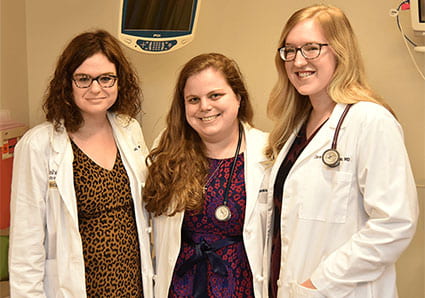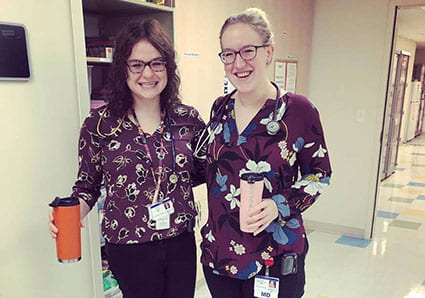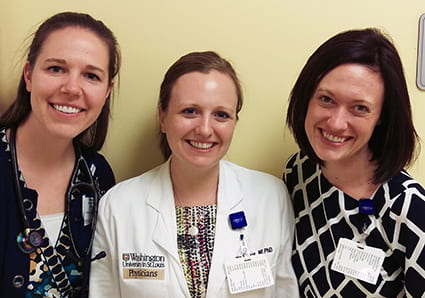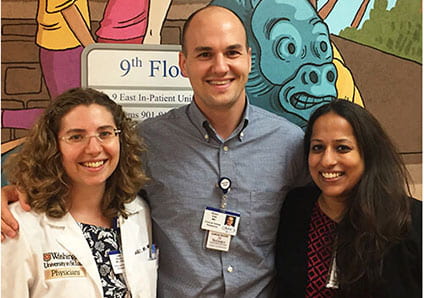The division has a nationally recognized fellowship program designed to train specialist pediatricians seeking a career in academic pediatric hematology/oncology.
The goals of our fellowship program are to develop outstanding clinicians who possess an in-depth experience in the evaluation, treatment and management of children with hematologic and oncologic diseases, and to develop high quality physician investigators who are well suited to pursue academic careers focused on clinical or laboratory research. Our ACGME-accredited training program is a three-year fellowship involving a comprehensive clinical curriculum spanning the scope of our specialty, as well an individualized program of clinical or basic science investigation. Additional training beyond the three- year curriculum to focus on further clinical sub-specialization or further develop research pursuits is possible.

The first year of the fellowship is focused on clinical training. During this time, fellows rotate through the three inpatient clinical services (hematology, oncology and stem cell transplant), acquiring the skills to direct a broad multidisciplinary team that cares for a complex patient population and ultimately assuming a leadership position on that team. They will acquire a primary patient population during this time for whom they will serve as the primary physician and will follow in their continuity clinic throughout the duration of fellowship. In addition to the inpatient services, first-year fellows rotate through a series of laboratories including coagulation/blood bank, HLA lab, cytogenetics, molecular diagnostics and clinical services including radiation oncology, pathology and pheresis. Hands-on training in the essential procedural skills of our discipline including bone marrow aspirations and biopsies, peripheral smear and bone marrow interpretation, intrathecal chemotherapy administration and clinical trial enrollment and management will be given during this phase of training. Finally, first-year fellows will receive an in-depth didactic lecture series from pediatric hematology/oncology faculty, as well as participate in a core curriculum through the department of pediatrics that covers topics such as grant and manuscript writing, mentorship, biostatistics, job searching and negotiation skills, wellness and others. This broad curriculum provides a strong foundation for the fellow, ensuring that he or she is well equipped with an extensive and sophisticated fund of knowledge. On-call responsibilities during the first year consist of approximately ten days (including 1-2 weekends) of overnight home call coverage per month. After the first year, call responsibilities are restricted to approximately one weekend every other month to protect the fellows’ time for scholarly activities.

After the first year, the fellow begins an individualized program of clinical, translational or basic science investigation mentored by faculty at Washington University. During this time, the fellow is expected to pursue original research following one of three pathways: clinical educator scholar, clinical and translational research scholar, or basic science research scholar. Additionally, we offer an adolescent-young adult (AYA) track with experiences and opportunities tailored for those who wish to develop an expertise in the care of these patients. In the first year of fellowship, the fellow proceeds with discussions with the division faculty and the program director to determine which path the fellow wishes to pursue and what strategy is most appropriate given their background and career goals. By the conclusion of the first year of fellowship, the fellow (with the assistance of the program director and division faculty) will have identified a primary mentor, outlined a scholarly project, and appointed a Scholarship Oversight Committee (SOC). Given the breadth and depth of research opportunities at Washington University, fellows are encouraged to consider faculty both within and outside of our division and department for their primary mentors and committee members. The primary mentor, program director and SOC (which meets at least every six months) will monitor the fellow’s progress throughout the research phase of training. Ultimately, it is expected that this phase will result in original discoveries in relevant research topics worthy of publication and the acquisition of extramural funding that will allow the fellow to further advance in his/her career. Many of our fellows have chosen to pursue additional training (e.g., Master’s degrees) during this time to support their research endeavors and training goals.

To ensure protected time during this phase of training, clinical responsibilities are limited to one half-day of continuity clinic per week and one weekend call every other month. In addition, fellows are expected to attend the divisional and subspecialty tumor boards. Fellows with a particular sub-specialty interest within hematology or oncology may elect to spend additional time in the relevant clinics, and will have the opportunity to focus their continuity clinic toward their interests as fellowship proceeds during the second and third year.
Strengths of our program
The exposure to a large and diverse patient population combined with didactic teaching and clinical mentorship from leaders within the field of pediatric hematology/oncology during the first year of training provides an excellent foundation for practice as a general hematologist/oncologist. Our fellows further standout on the job market due to their ability to subspecialize their clinical practice (e.g. focus their clinical practice to high risk leukemia, neuro oncology, non-malignant hematology and etc.) during the second and third years of training.

The program has a long history of developing successful physician investigators, in both clinical and basic science research. Because of this precedent, there are clearly defined training pathways for each avenue of research that are fully supported by the division and department, including bolstering traditional medical training with MSCI or MPH degrees and research support through foundation awards, intramural support or NIH training and career development awards (T32, KL2, K12, K08 and K23). Our fellows have published numerous articles in highly competitive areas of biomedical research, and they continue to maintain a history of success in acquiring extramural funding support. Thus, fellows who graduate from our program can be confident that they will meet the challenges they will face as they advance through their academic careers.
As evidence of our training and support of fellows with a diverse set of career goals, our recent graduates have accepted faculty positions (clinical and investigator track) across the nation, pursued additional fellowship training in stem cell transplant and accepted positions at the U.S. Food and Drug Administration.








